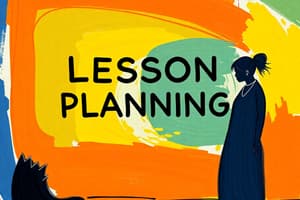Podcast
Questions and Answers
Why is prior knowledge important for lesson planning?
Why is prior knowledge important for lesson planning?
- It ensures that students have not forgotten previous lessons.
- It helps in understanding what needs to be learned. (correct)
- It allows teachers to assign homework effectively.
- It determines the methods used in class.
What is a common issue faced by novice teachers when planning lessons?
What is a common issue faced by novice teachers when planning lessons?
- They often forget to assess student readiness.
- They fail to consider classroom management strategies.
- They underestimate the importance of equipment availability. (correct)
- They do not review previous lesson content.
What is often necessary for effective lesson planning?
What is often necessary for effective lesson planning?
- A focus on homework assignments.
- A strict adherence to textbooks.
- Emphasis on formal evaluations.
- Engagement with existing school systems. (correct)
What can happen when a planned lesson encounters unforeseen problems during delivery?
What can happen when a planned lesson encounters unforeseen problems during delivery?
Which of the following is crucial for effective monitoring in learning?
Which of the following is crucial for effective monitoring in learning?
How can teachers access prior knowledge of students effectively?
How can teachers access prior knowledge of students effectively?
What misconception might novice teachers have about lesson planning?
What misconception might novice teachers have about lesson planning?
What should teachers consider when planning a lesson to avoid issues later on?
What should teachers consider when planning a lesson to avoid issues later on?
What is a primary difference between experienced teachers and novice teachers in lesson planning?
What is a primary difference between experienced teachers and novice teachers in lesson planning?
Why might an observed lesson require more detailed planning?
Why might an observed lesson require more detailed planning?
What misconception do novice teachers often have about lesson planning?
What misconception do novice teachers often have about lesson planning?
How do experienced teachers differentiate their planning process?
How do experienced teachers differentiate their planning process?
What might be a reason for asking novice teachers to produce detailed lesson plans?
What might be a reason for asking novice teachers to produce detailed lesson plans?
What aspect of lesson planning is often overlooked by novice teachers?
What aspect of lesson planning is often overlooked by novice teachers?
What may contribute to the differences in lesson planning practices between novice and experienced teachers?
What may contribute to the differences in lesson planning practices between novice and experienced teachers?
How do experienced teachers manage lesson details that seem absent in their documentation?
How do experienced teachers manage lesson details that seem absent in their documentation?
What is one of the main concerns Ofsted has regarding lesson planning?
What is one of the main concerns Ofsted has regarding lesson planning?
What misconception do teachers often have about Ofsted inspections?
What misconception do teachers often have about Ofsted inspections?
How much time do some teachers reportedly spend on lesson planning each week due to inspection preparation?
How much time do some teachers reportedly spend on lesson planning each week due to inspection preparation?
What does the Government suggest regarding the requirement of written lesson plans for teachers?
What does the Government suggest regarding the requirement of written lesson plans for teachers?
What are teachers encouraged to focus on instead of filling out extensive lesson plan templates?
What are teachers encouraged to focus on instead of filling out extensive lesson plan templates?
According to the content, what should inspectors understand when observing a lesson?
According to the content, what should inspectors understand when observing a lesson?
What is one reason why teachers may create lengthy lesson plans?
What is one reason why teachers may create lengthy lesson plans?
What is the Government's stance on centralized lesson planning?
What is the Government's stance on centralized lesson planning?
What impact can a novice teacher's lack of experience in thinking on their feet have on a lesson?
What impact can a novice teacher's lack of experience in thinking on their feet have on a lesson?
Why is lesson planning considered a complex activity for teachers?
Why is lesson planning considered a complex activity for teachers?
Which of the following is NOT a factor considered in professional expertise of teachers?
Which of the following is NOT a factor considered in professional expertise of teachers?
What can happen if a novice teacher's planning flaws are left unchecked?
What can happen if a novice teacher's planning flaws are left unchecked?
In what way is the professional expertise of teachers described?
In what way is the professional expertise of teachers described?
What should lesson planning take into consideration?
What should lesson planning take into consideration?
What is a potential consequence of novice teachers struggling with lesson planning?
What is a potential consequence of novice teachers struggling with lesson planning?
What aspect of teaching does planning for learning involve?
What aspect of teaching does planning for learning involve?
What is the primary benefit of using a lesson planning template with timings?
What is the primary benefit of using a lesson planning template with timings?
How long is the lesson example discussed in the content?
How long is the lesson example discussed in the content?
What should a teacher do if the planned timings during a lesson are not realistic?
What should a teacher do if the planned timings during a lesson are not realistic?
Which statement is NOT true about lesson plans according to the content?
Which statement is NOT true about lesson plans according to the content?
What do the timings in the lesson planning template indicate?
What do the timings in the lesson planning template indicate?
In the example provided, how are many episodes structured in relation to time?
In the example provided, how are many episodes structured in relation to time?
Why might a teacher find the initial planned timings unrealistic during a lesson?
Why might a teacher find the initial planned timings unrealistic during a lesson?
What is the essence of treating a lesson plan as a flexible document?
What is the essence of treating a lesson plan as a flexible document?
What is the primary purpose of a lesson plan?
What is the primary purpose of a lesson plan?
What do seasoned lesson observers generally expect during a lesson?
What do seasoned lesson observers generally expect during a lesson?
Which of the following statements best represents the relationship between teaching and learning?
Which of the following statements best represents the relationship between teaching and learning?
In what scenario may it be acceptable for the teacher to work harder than the pupils?
In what scenario may it be acceptable for the teacher to work harder than the pupils?
What is a critical reflection question for a teacher to consider during lesson planning?
What is a critical reflection question for a teacher to consider during lesson planning?
What aspect should always remain at the forefront when planning lessons?
What aspect should always remain at the forefront when planning lessons?
How can lesson effectiveness be measured according to seasoned observers?
How can lesson effectiveness be measured according to seasoned observers?
What misconception might arise from focusing too much on teaching during a lesson?
What misconception might arise from focusing too much on teaching during a lesson?
Flashcards
Lesson Planning
Lesson Planning
The process of creating a structured outline for a lesson, including objectives, activities, and assessments.
Ofsted Inspection
Ofsted Inspection
An official inspection of schools by Ofsted (Office for Standards in Education, Children's Services and Skills) to evaluate their effectiveness.
Ofsted Lesson Plan Myth
Ofsted Lesson Plan Myth
The misconception that Ofsted inspectors require detailed written lesson plans for every lesson.
Ofsted Focus
Ofsted Focus
Signup and view all the flashcards
Lesson Plan Workload
Lesson Plan Workload
Signup and view all the flashcards
Lesson Plan Template
Lesson Plan Template
Signup and view all the flashcards
Flexible Planning
Flexible Planning
Signup and view all the flashcards
Sequence of Teaching
Sequence of Teaching
Signup and view all the flashcards
Prior Knowledge
Prior Knowledge
Signup and view all the flashcards
Sequence of Learning
Sequence of Learning
Signup and view all the flashcards
Equipment Availability
Equipment Availability
Signup and view all the flashcards
Flexibility in Lesson Planning
Flexibility in Lesson Planning
Signup and view all the flashcards
Assessing Prior Knowledge
Assessing Prior Knowledge
Signup and view all the flashcards
School Systems
School Systems
Signup and view all the flashcards
Addressing Problematic Aspects
Addressing Problematic Aspects
Signup and view all the flashcards
Student Needs
Student Needs
Signup and view all the flashcards
Lesson planning with timings
Lesson planning with timings
Signup and view all the flashcards
Lesson episodes
Lesson episodes
Signup and view all the flashcards
Lesson plan not a 'fixed object'
Lesson plan not a 'fixed object'
Signup and view all the flashcards
Assessing lesson timing realism
Assessing lesson timing realism
Signup and view all the flashcards
Lesson Plan
Lesson Plan
Signup and view all the flashcards
Outline lesson plan with timings
Outline lesson plan with timings
Signup and view all the flashcards
Invisible Expertise
Invisible Expertise
Signup and view all the flashcards
Lesson planning for effective learning
Lesson planning for effective learning
Signup and view all the flashcards
Sequence of learning activities
Sequence of learning activities
Signup and view all the flashcards
Pedagogic Content Knowledge
Pedagogic Content Knowledge
Signup and view all the flashcards
Planning for Learning
Planning for Learning
Signup and view all the flashcards
Novice-Expert Continuum
Novice-Expert Continuum
Signup and view all the flashcards
Experienced vs. Novice Planning
Experienced vs. Novice Planning
Signup and view all the flashcards
Lesson Plan Detail and Observation
Lesson Plan Detail and Observation
Signup and view all the flashcards
Prior Knowledge in Planning
Prior Knowledge in Planning
Signup and view all the flashcards
Lesson Plan Detail and Observation
Lesson Plan Detail and Observation
Signup and view all the flashcards
Addressing Potential Problems
Addressing Potential Problems
Signup and view all the flashcards
Flexibility in Planning
Flexibility in Planning
Signup and view all the flashcards
School Systems and Planning
School Systems and Planning
Signup and view all the flashcards
Student-Centered Planning
Student-Centered Planning
Signup and view all the flashcards
Addressing Student Needs
Addressing Student Needs
Signup and view all the flashcards
Lesson Plan Purpose
Lesson Plan Purpose
Signup and view all the flashcards
Study Notes
Lesson Planning Itself
- Lesson planning involves considering the whole lesson, common pitfalls, and what lesson planning can and can't achieve.
- Experienced teachers often have actions that are invisible during lessons; this can lead to the misconception that good subject knowledge is the only requirement for teaching.
- Pedagogical content knowledge (Shulman 1986) is not sufficient on its own to make a good teacher.
- Novice teachers may spend a disproportionately high amount of time planning compared to experienced teachers (e.g., 10:1 ratio for novice teachers, decreasing with experience towards 1:1).
- Lesson planning is distinct from filling in a lesson plan template, with the former being more important.
- Planning for learning involves thinking about what will be learned, the activities, episodes, questions asked, and resources.
- A lesson plan template should not be seen as a definitive solution to lesson planning, as no single template will solve all planning problems.
- Lesson planning alone cannot ensure learning; other factors such as behavior management are also important.
What Lesson Planning Cannot Achieve
- The myth that longer planning time equates to more successful lessons is incorrect.
- Over-planning lessons, especially when behaviour is a challenge, can be counterproductive.
- Lesson planning does not ensure learning; the experience in the classroom is crucial.
What Should a Lesson Plan Include
- Lesson plans can vary in terms of required content.
- Lesson plans should consider the needs of the students within the classroom, and differentiate accordingly.
- Lesson plans should include aims and objectives.
- Lesson planning can include intended learning statements.
- Lesson plans should consider learning episodes and allocating appropriate time.
- Planning considers timing for various components of a lesson.
Lesson Planning for Effective Learning
- Lesson execution and planning vary, with experience affecting how a lesson is delivered.
- Experienced teachers adapt lesson plans during execution, considering factors such as time and behaviour management, and do not typically have rigidly fixed lesson plans.
- Lesson planning should focus on learning, not just on activities.
- An important element in lesson planning is evaluating teaching and learning to enable future flexibility.
- Lesson planning templates can assist with structuring and monitoring lessons, but the importance of thinking is paramount.
- It's important to consider the intended recipients of the plan (e.g., teacher, department head, pupils).
Common Pitfalls in Lesson Planning
- Over- or under-allocating time for lesson elements.
- Trying to cram too many items into a lesson.
- Under-scheduling or over-specifying activities.
- Planning for an ideal class rather than the actual class.
- Ignoring previous learning and not building upon prior knowledge.
- Over-reliance on equipment availability or rotas for materials.
- Difficulties with time management (e.g., running over time during execution).
Reflective Questions
- Teachers should reflect on their lesson planning and delivery, focusing on teaching or learning, timing, and common pitfalls encountered.
- Reflecting on effective timings, changes between activities, and sequencing learning is important for teachers.
Studying That Suits You
Use AI to generate personalized quizzes and flashcards to suit your learning preferences.





